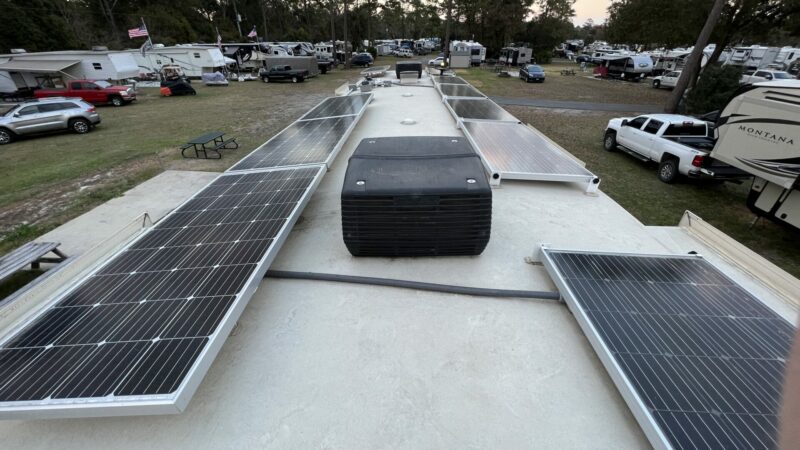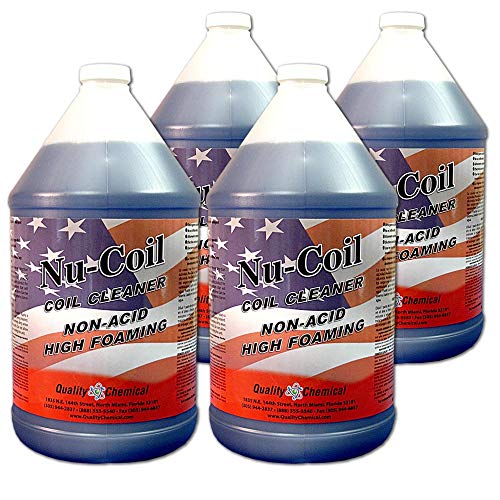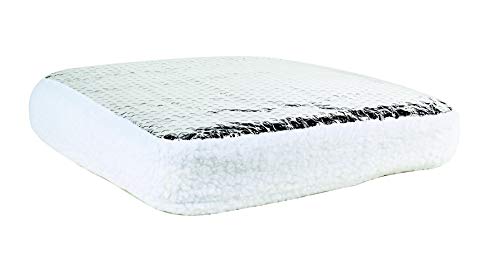Table of Contents Show
Nothing can turn you into an unhappy camper faster than a hot RV. It’s hard to enjoy camping when you’re dripping sweat. If you’re tired of suffering from heat exhaustion when you use your rig, we have some RV AC repair tips that might help.
Today, we’re looking at why your RV air conditioner might not be keeping up and what you can do about it. Let’s get started!
What Is An RV Air Conditioner?
An RV air conditioner works similar to a residential AC; however, it’s for an RV. These units suck in air and use evaporators, compressors, and condensers to remove the warm air.
Then they use a blower to push cooler air into the RV. However, because RVers often travel, they usually mount these AC units to an RV’s roof.
Having an AC unit in an RV makes it possible to camp during the summer months.
Without an AC, an RV can feel like a hot box, making it nearly impossible to enjoy camping.
Smaller rigs can get by with a single air conditioner, but larger campers will often have two or three roof-mounted air conditioners.
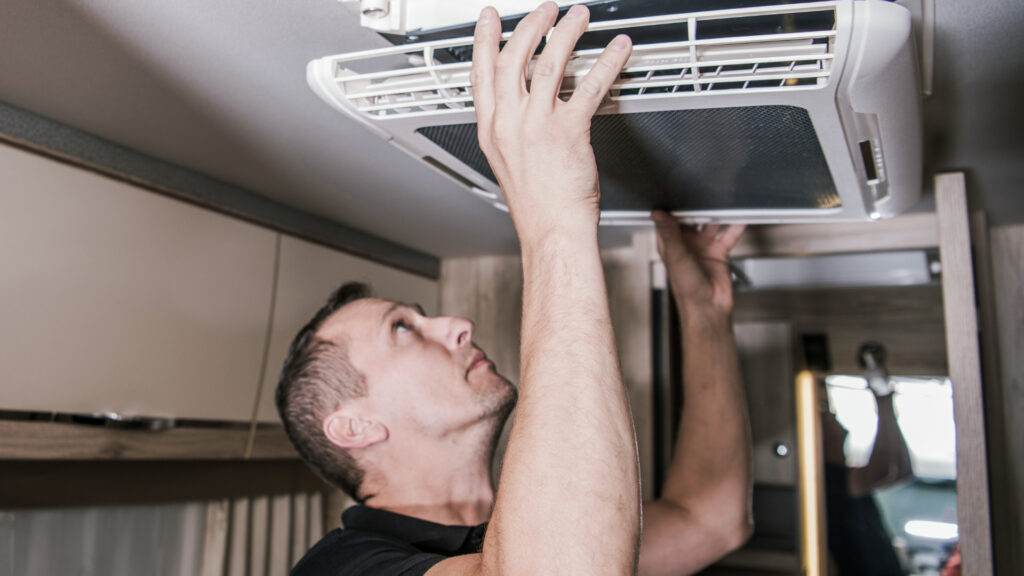
Why Is My AC Not Cooling Quickly?
If you’re noticing that your AC is not cooling quickly, basic RV AC repairs might fix it.
AC units have filters, coils, and fins that catch dust and other particles in the air.
The more you’re running your AC unit, the more often you’ll need to check them.
Even if you keep everything clean, it’s essential to consider the outside temperature. RVs, like vehicles, often lack insulation.
You know how hot a car can get if you’ve ever climbed into your car on a summer’s day.
Your AC unit can only do so much, and on sweltering days, it can struggle to cool your RV.
However, we’ll share some tips to cool your rig down quickly.
How Do I Make My RV Air Colder?
The best way to make your RV air colder is to ensure your AC unit is clean.
Keeping all components clean provides the best possible pathway for air to travel through your AC unit.
This helps the AC run efficiently and maximizes the results.
RV manufacturers often do an inadequate job sealing air ducts, which causes cool air to leak out before reaching your air vents.
However, there is a simple modification you can make to most RV air conditioners to make them more efficient.
You’ll need to create a barrier inside the AC vent to help route air in and out of your unit.
The RV Airflow System will get the job done if you’re uncomfortable with the DIY route.
RV AC Repair Tips to Get Cold Air Fast
If you want to stay cool this camping season, you can do a few things to help. Here are a handful of tips to get cold air fast in your RV. Let’s take a look!
Clean or Replace the Air Filter
The more you use your AC, the more often you should check the air filters.
You want them to be as clean as possible to allow air to pass through efficiently. Some units have reusable filters, while others require you to purchase replacements.
Reusable filters are typically easy to clean.
Running them under a faucet or garden hose will often wash away the dirt and debris from the filter. Let them air-dry completely before reinstalling them.
- Filters: Pet Dander, Pollen, Dust.
- Installs easily in seconds. Rated for 90 days of use.
Keep in Mind: Would covering your RV AC help your air conditioner? Do you need to cover your RV air conditioner? Let’s check it out!
Clean the Coils Or Fins
The coils and fins on your AC unit help improve the efficiency of your AC unit.
However, this will require you to gather a few supplies and climb on your roof.
You’ll need a soft brush, condenser cleaner, and evaporator coil cleaner.
You want to gently scrub the condenser coils and evaporator coils before spraying the cleaner on them.
Cleaning the coils and fins of your RV AC unit takes some time but should be a part of your annual maintenance and repair.
- Evap foam will liquefy dirt, grease, oil, and other residues quickly and easily
- Since it is fortified with corrosion inhibitors, it is safe for use on metals and other materials
- ✅ CLEAN YOUR AC COILS FAST - This foaming coil cleaner quickly and easily cleans air conditioner coils. Simply spray...
- ✅ REMOVES DIRT & DEBRIS - Our foaming coil cleaner is designed to remove dirt, dust, grease, oil and other debris from...
- PROFESSIONAL QUALITY - Same tool used by HVAC plumbing and heating contractors
- SAVE MONEY - Clean your appliances yourself and save expensive maintenance costs
Make Sure You’re Getting Enough Power to the Unit
The summer heat can put a campground’s electrical system to the test.
If you’re cranking your AC 24/7, there’s a chance that everyone else in the campground is doing the same.
If the campground’s electrical system cannot handle the load, you may experience voltage drops.
These voltage drops can be hazardous to your AC unit and any electronics inside your RV.
Because these voltage drops typically occur unexpectedly, we recommend using an EMS (Electrical Management System).
These devices monitor the flow of electricity into your rig and shut down when the conditions are no longer safe for the system.
These devices often aren’t cheap but can pay for themselves if they help you avoid replacing thousands of dollars in electronics.
- ELECTRONIC SAFETY MAINTAINED: Ensure the safety of your Progressive Industries surge protector electronics with the 50...
- COST-EFFECTIVE RV SURGE PROTECTOR: Rated at 50A/120-240V/12,000W, the EMS-PT50X can absorb surges up to 3,580 joules.,...
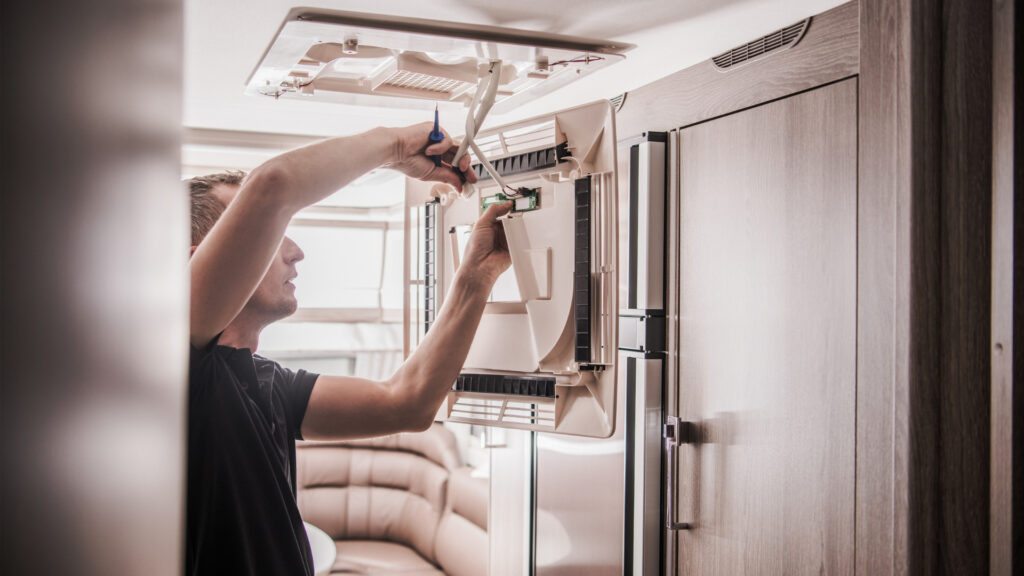
Check the Wire Connections Inside the Unit
Loose connections can cause issues for your AC unit. Wires can wiggle loose from hitting bumps and potholes while on the road.
Sometimes, you need to wiggle or tighten a connection to repair the AC in your RV.
You should completely shut off the power to your RV when working on anything electrical.
If not, you’ll be in for a shocking surprise if you touch a live wire. A trip to the emergency room is not how you want to spend your time camping.
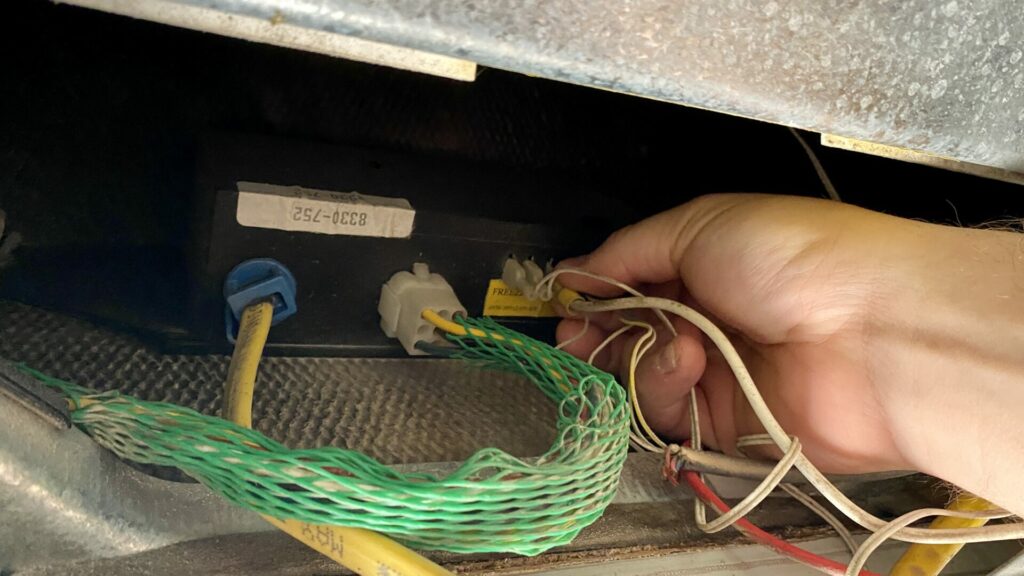
Park Your RV in the Shade
By parking your RV in the shade, you prevent the sun from heating the interior. You can keep your RV cooler by parking your rig, so the sun doesn’t shine on the broadside all day.
Massive windows may be excellent for enjoying the epic views of the surrounding landscape, but they also let in a tremendous amount of heat.
Parking so that the evening sun doesn’t shine into them can help cool your rig faster.
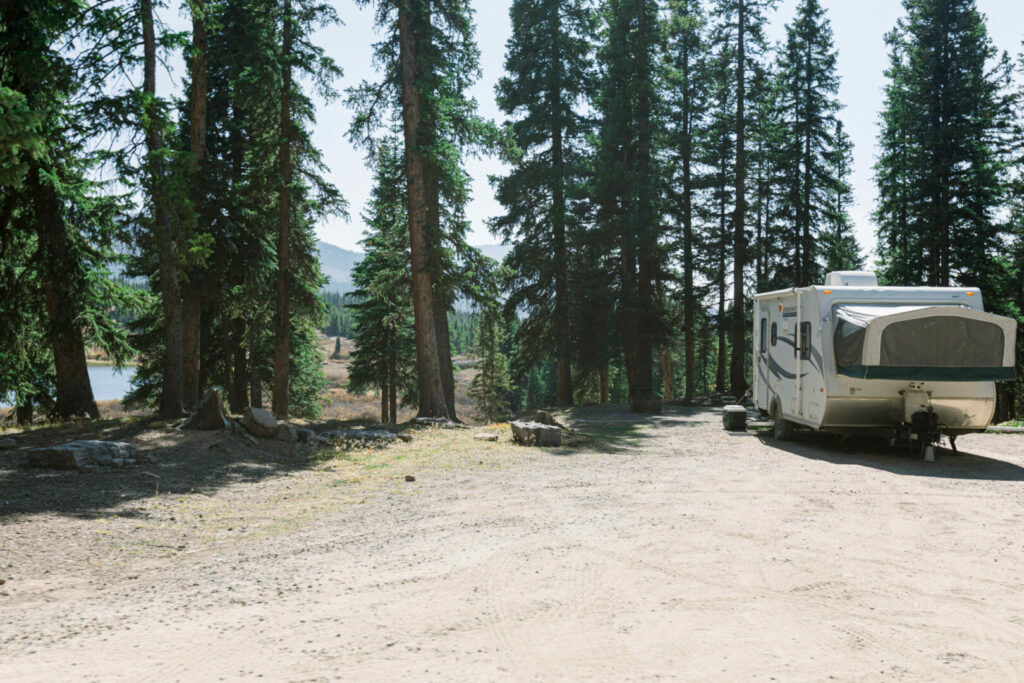
Insulate Windows and Roof Vents
Heat can flow through the windows and roof vents in your RV.
If you don’t think the heat is getting in through your windows, put your hand against them the next time you’re camping in the heat.
It might surprise you how much heat enters your rig through the window.
Keeping your window blinds closed and installing thermal insulated curtains can keep the heat out of your RV.
We recommend using an RV vent insulator to keep the cool air in and the warm air out of your RV.
Keep in Mind: RV accessories can enhance your RV getaways, but there are some that may do the opposite. We found the absolute worst RV accessories
- RV VENT REFLECTIVE INSULATION: Camco’s vent insulator blocks the sun's damaging rays. It helps keep your RV cooler in...
- SAVES ENERGY: This product reduces heat transfer and increases A/C efficiency.
Can You Repair Your RV AC?
The great thing about an RV AC is that repair can be relatively straightforward.
Most of the issues RVers experience with them are fixable.
If you maintain and take care of your RV air conditioner, it will likely care for you for 10+ years.
If you’re not comfortable doing a DIY repair on your RV AC, there are mobile mechanics and other service centers that can help keep your unit running.
Follow our tips, and you won’t have to spend another camping trip in the heat!
Last update on 2024-07-26 / Affiliate links / Images from Amazon Product Advertising API




